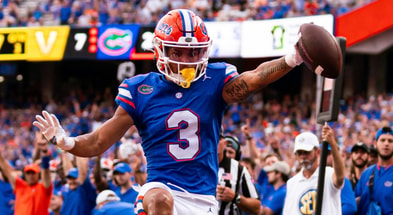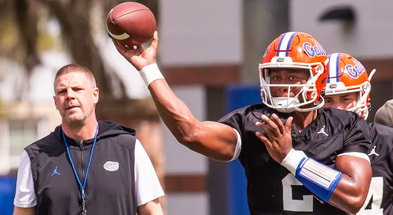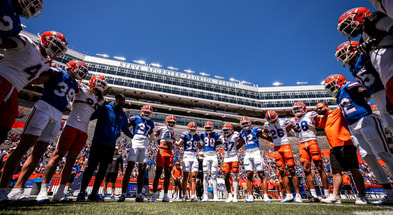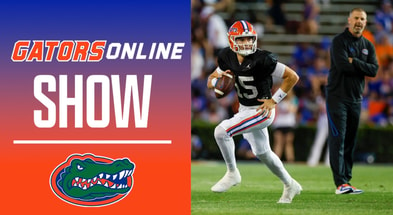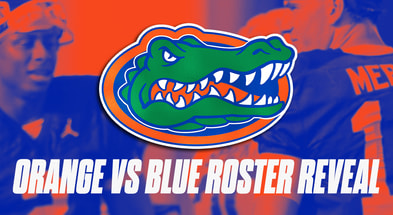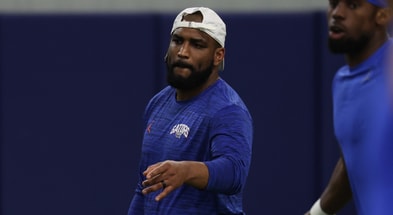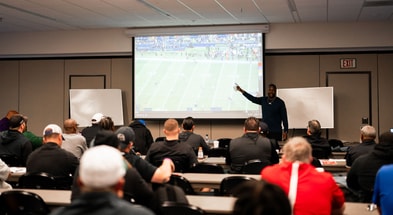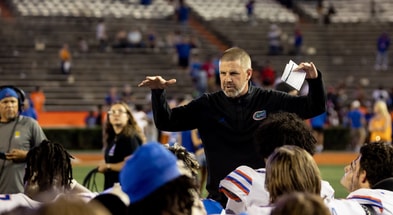Savannah Bailey discusses GatorMade Week, the initiative's impact
GAINESVILLE, Fla. — Homecoming isn’t the only thing being celebrated this week by the Florida football team. It’s also the first GatorMade Week, a new tradition to raise awareness and promote the innovative initiative.
GatorMade, launched by Florida coach Billy Napier in January, is a holistic player-focused and purpose-driven program that develops football players during their time at UF and beyond.
In honor of GatorMade Week, the team will wear helmet decals of the GatorMade logo during the game against Mizzou.
“It’s really about creating awareness about our player development program that specifically has been put together to work on and equip and educate and create experiences for our players. It’s all about life after football,” Napier said Wednesday. “We made a significant investment there. We got four full-time staff members. Savannah Bailey, Vernell Brown Jr., Marcus Castro-Walker and Diane Lebon, which I would argue we’ve got the best in the entire country. We’ve got really special leadership there.
“We’re nine months into this thing, and it’s only going to get better going forward. We did the Greece abroad service trip. We did also the Atlanta GatorMade business break. We’re going to New York City in 2023. … We want to equip and educate the players. We want to create experiences for the players, ultimately that changes and impacts lives for the better. Hopefully these young men leave here more prepared for life after ball.”
Savannah Bailey, Florida’s senior director of player relations and GatorMade, met with the media Wednesday to discuss the mission of GatorMade and its growing impact on the football program.
RELATED: How GatorMade changed Justin Shorter’s ‘whole perspective on life’
Q&A with Savannah Bailey of GatorMade
What’s the goal of GatorMade Week?
“I think it’s just an excellent opportunity to get more and more people aware. It’s not necessarily a programming week; it’s a marketing week. It’s for every potential investor, potential corporate partner, anybody that wants to offer an internship or mentorship or whatever that looks like can come in and get involved. We just want to make sure people know what’s out there, what’s being offered to our guys so they can grow continually through the Florida network.”
How did you get into this career field?
“A little tricky. I have a background in student affairs and in counseling, so it kind of matches together. I was always boys growing up, was always around boys pretty much my whole life and eventually it just became natural, and I think sometimes providing a very different perspective. A lot of times you have just a former player in this role. And while that’s one perspective, it’s still a perspective. So, what does it look like to have someone else that maybe mimics what mom might treat you like or what an older sister might treat you like, what someone else can provide for you that isn’t the same. Even in our team, the diversity that we have, and experience and age is perfect.”
How different is GatorMade than what you were part of at Clemson?
“It’s actually pretty similar, and I think that’s a key piece of it. Anyone that’s truly about the development of young men isn’t going to care if it’s from here or from there, it’s ‘are you making better men in general that are going to go out and lead communities and lead board rooms and lead cities and whatever else. That’s what I want: I want to turn our guys into leaders and give them every opportunity to develop and to grow.”
How unique is UF’s setup with the GatorMade program?
“You’re talking about taking all of the resources of Florida but then having the people that either went to Florida or have no connection to Florida. So, they have all kinds of other pieces, whether it be from a business side or from a donor side or from a tradition, everything. We have West Coast-East Coast rap battles all the time happening between Marcus and myself. All of that stuff is just kind of a key piece; whatever you’re looking for, we want you to find it here. Whoever best relates to you, awesome. We want to make sure everyone has someone they can call kind of theirs and that they have someone that they’re going to trust with their vulnerabilities and needs and everything else that’s not in a coach’s perspective of X’s and O’s and controlling playing time. You’ve got to have that other piece to it, too. If you’re going to treat them like people, you got to treat them like people.”
How important is the Speaker Series and providing outside voices?
“Whenever we have speakers I always try to mix it up between education and motivation or inspiration, you don’t want all hype people but you don’t want to leave them high and dry, too, of what’s the application here, so it’s having that balance and having that mixture, so whether it be talking about recovery and health and safety or having Inky Johnson come in and Eric Thomas come in, and talk through what does it look like to stay motivated for the rest of the season. Because even now we’re halfway through and Ventrell is quoting someone from that speaker series. So, whatever it is that sticks with someone I want to make sure that in the same way we keep diversity in our staff that we are doing that with everything that we have. Who can really talk through language but in a different way you never know what someone is going to hang up on in what you say, and I want to make sure that everyone has an opportunity to have an outlet for connecting with someone.”
What are the mental health concerns with social media and more TV exposure?
“That’s the kind of stuff you are not going to have an article about, you are not going to have a full-fledged story, the programs, are sexy and they are big and that’s awesome, they are broad service trips but it’s the daily interactions that I think make the biggest difference, right, every space possible, we’re at practice, we’re at the meals, we’re in the team meetings spaces. You’re just there, to see hear, observe everything and soak that in with him so you can process a lot of that stuff with them, too. Just being around. You never know when they are going to tap your shoulder and say, ‘Miss Savanah, can I come talk to you’ and it can be about anything and everything and just stay ready for that.”
Is it harder for student-athletes to maintain their mental health?
“I think it always has been a challenge. I think just now it’s much more to the front of how athletes are using their platform to describe what their experiences have been, and I love that for them, right? I think it can be really freeing to say, ‘Hey this is what I have going on, this is what I know my teammates have going on.’ But it can be really scary, too. It’s a very vulnerable position and I think traditionally football has not been a very show your vulnerability sport, so even encouraging that and what that looks like as a leader in their own development, too.”
Not every kid comes from a good family background. How important is providing family-like support?
“I think family is something that you can choose. And I think sometimes finding that peer support on their team and in their staff. Like, it’s not our job to just pour into every single piece of them or really drag everything that we can out of them. It’s them investing in themselves. Football is just a tool for life. It is not something that you rely your whole life on. But you can use it to power yourself to go through many, many doors. That can always be a lead for you. ‘Well, I played football at Florida.’ Now I’m connected to all of the alumni. So, I think it’s choosing some of that family and being able to fulfill those different roles for people. Whether it be because they feel more comfortable talking to a woman, to this, to that. Whatever that looks like and making sure we’re always available for them.”
How does what you do affect the product on Saturday?
“Two main words that just kind of come to mind. Maturity, right? If you’re a more mature person, you’re going to make some better decisions. You’re better in high-pressure situations. And I think just general leadership and empowerment. What does it look like to be comfortable in who you are? That identity, and then that intellect. Do you have the ability to communicate what you know? The influence part, can you spread that to your team or anybody else? And the impact. Can you go out and do it in a game and impact a whole lot of other people that are then queued into just watching you.”
How do you figure out what you need to be to each player?
“Well, it’s a game of relationships. Again, the programs are cool, and the programs make articles, but it’s the relationship piece. And for me, it’s always kind of being my most authentic self. I’m not perfect and I will happily kind of sit back and learn. I’ll throw out a swear word on accident. And I’m like, ‘Oh man.’ There are all kinds of things that just happen. And I think just showing people that you’re also a person, but you trust in your development with them and their development with you. You always make it a mutually edification kind of cycle. What does it look like to be bought into each other?”
How often do you or other staff members talk to the parents?
“We actually do have when Diane Lavon, she’s our parent liaison. So, she helps communicate all that information with them. She does an excellent job of keeping them informed. She is like the auntie that everyone wishes they had … super fashionable, all the things. But when it comes to kind of direction from the parents, mine isn’t so much to be a resource for them. I’m a resource for your son in the same way that we would hope that you’re not calling your son’s CFO or somebody of the job that they’re working at saying what are they doing? This is part of that maturity and part of that that growth cycle of what is it like to let go a little bit but still trust the resources that are there.”
What been your favorite part about GatorMade so far?
“I think one of my favorite things is honestly standing at the top of our team meeting room and watching the guys kind of shuffle in and you get your hugs, you get your fist bumps, you get your, ‘How are you, Miss Savannah?’ Having gone from the first day when they’re looking at me, ‘Who is the lady that’s yelling at me in the front of the room?’ To now have like, ‘Oh, this is my person. I’m happy to come talk to her like. I’m gonna meet up with her later, whatever.’ That part, and that’s my favorite. And if that’s not your favorite of doing this kind of job, if you have this kind of role, then you shouldn’t do it.”
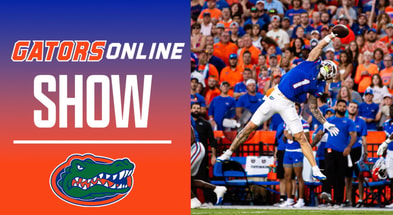
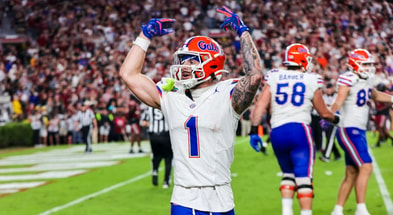
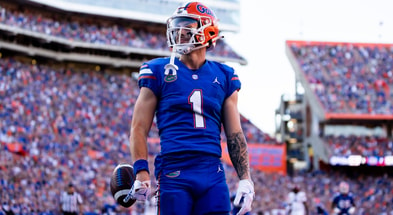
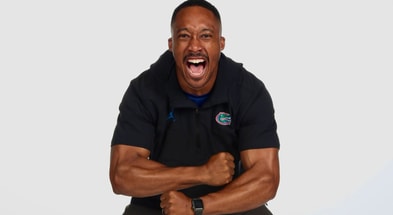
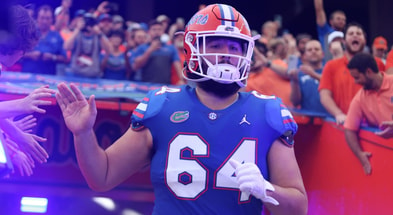
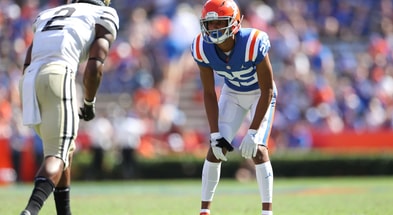
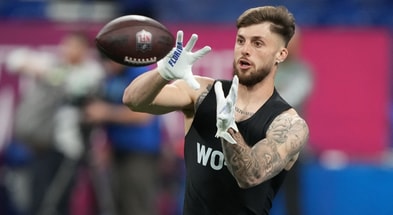
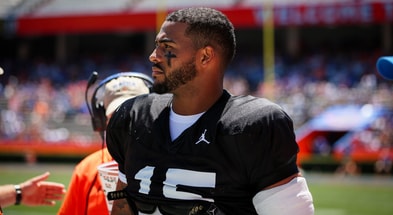

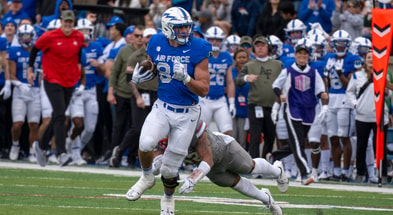
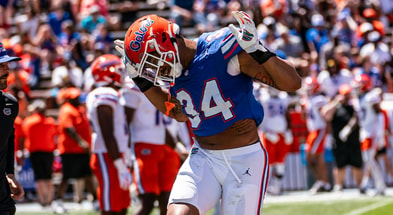
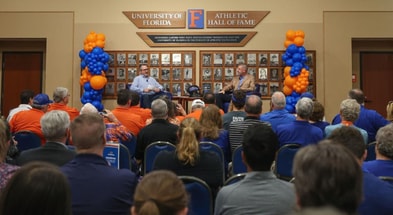
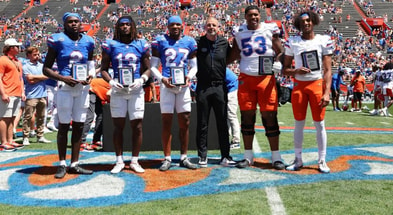
![Florida Gators head coach Billy Napier celebrates with Florida Gators wide receiver Aidan Mizell (11) after a touchdown during the first half at the Orange and Blue spring football game at Steve Spurrier Field at Ben Hill Griffin Stadium in Gainesville, FL on Saturday, April 13, 2024. [Matt Pendleton/Gainesville Sun]](https://on3static.com/cdn-cgi/image/height=215,width=393,quality=90,fit=cover,gravity=0.5x0.5/uploads/dev/assets/cms/2024/04/13155133/Untitled-design-65-2.png)
